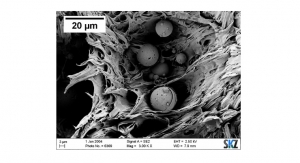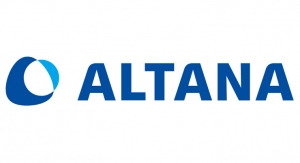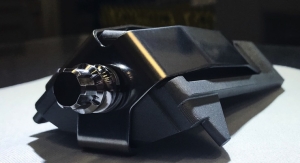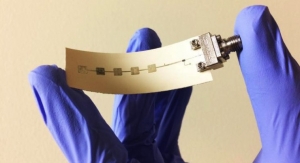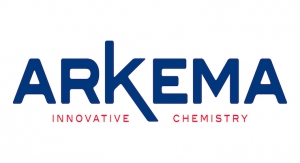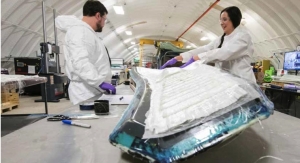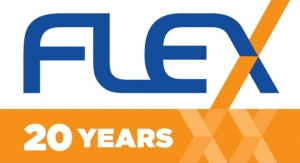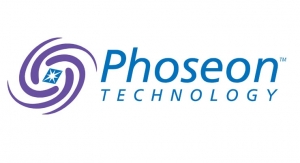03.21.17
During the Additive Manufacturing Users Group (AMUG) conference, HP Inc. announced significant milestones to its open platform for 3D printing materials and production-ready applications development.
Expanding the development and lowering the cost of advanced 3D printing materials and applications is a critical catalyst for the digital reinvention of the global manufacturing industry. HP’s open platform model for 3D printing helps expand the availability of new materials and addresses a broader set of applications.
The open platform model also helps lower materials and development costs, drive speed and performance improvements, and create new possibilities for part properties meeting specific industry needs.
“An open ecosystem of industry leaders is critical for greater innovation, breakthrough economics, and faster development of 3D printing materials and applications,” said Tim Weber, global head, 3D Materials and Advanced Applications at HP. “Our growing certified partner network and leading-edge lab facilities are a testament to the progress we are making in spearheading a dynamic community of collaborators focused on delivering the most innovative and production-ready 3D printing solutions.”
HP, in collaboration with SIGMADESIGN, will offer the industry’s first MDK for 3D printing materials, ensuring a robust and expanding array of materials for end-customers and a simplified certification and testing process for partners.
An integral element of HP’s open platform strategy for 3D printing, the MDK will enable companies interested in certifying their materials to quickly test 3D powder spread-ability and compatibility with HP Jet Fusion 3D printers prior to submitting the materials to HP for testing. This greatly simplifies the testing and certification process, leading to faster innovation cycles while achieving strict quality standards.
“Materials are at the center of successful manufacturing, and the combination of HP’s open platform and the ability to enable voxel-level control will help expedite the digital transformation of this multi-trillion dollar market,” said Bill Huseby, president and CEO, SIGMADESIGN.
The MDK is expected to ship this spring and partners can pre-order the kit beginning today by contacting [email protected].
Building on its open platform vision and leveraging more than four decades of print innovation, HP took the wraps off the world’s first state-of-the-art laboratory to help companies develop, test and deliver the next generation of materials and applications for 3D printing. Located in Corvallis, OR, the new HP 3D Open Materials and Applications Lab will offer partners a range of equipment and in-house expertise to accelerate materials and applications innovation, which is critical to quickening the evolution and adoption of 3D printing technologies.
In May 2016, HP announced the HP Jet Fusion 3D Printing Solution, a production-ready commercial 3D printing system that delivers superior1 quality physical parts up to 10 times faster and at half the cost of current 3D print systems. In addition, by printing functional parts at the individual voxel level (a voxel is the 3D equivalent of a 2D pixel in traditional printing), HP offers customers an unprecedented ability to transform part properties and deliver mass customization.
Global materials leaders and existing HP partners, BASF and Evonik shared details about new innovations being developed using HP’s open platform and the opportunity to work in the new HP 3D Open Materials and Applications Lab.
“At BASF, our goal is to enable customers to produce resilient and functional parts through the use of innovative material solutions,” said Kara Noack, head of 3D-Printing North America, BASF. “Using the HP Open Platform and its one-of-a-kind testing lab in Corvallis to accelerate material development is helping to unlock the potential of 3D printing.”
Noack also shared the advantages of working inside HP’s 3D Open Materials and Applications Lab and the progress the company is making on certified materials for HP’s Multi Jet Fusion technology.
“Based on BASF’s experience and R&D capabilities, we have been able to accelerate the development of materials with better mechanical properties by leveraging HP’s 3D Open Materials and Applications Lab,” she noted. “We have been able to develop multiple versions of thermoplastic elastomers including TPU, thermoplastic polyurethane, adding to an already comprehensive product portfolio.”
Evonik was the first partner to announce plans to commercialize a certified material for the HP Open Platform. Evonik shared specifics on the upcoming availability of VESTOSINT 3D Z2773, a PA-12 powder material introduced for the HP Jet Fusion 3D Printing Solution and insight into the development process.
“In October, we announced successful certification of VESTOSINT 3D Z2773, and we are now excited to confirm initial availability in May with the full commercial offering available for our customers shortly thereafter,” said Dr. Matthias Kottenhahn, head of the Business Line High Performance Polymers of Evonik.
Expanding the development and lowering the cost of advanced 3D printing materials and applications is a critical catalyst for the digital reinvention of the global manufacturing industry. HP’s open platform model for 3D printing helps expand the availability of new materials and addresses a broader set of applications.
The open platform model also helps lower materials and development costs, drive speed and performance improvements, and create new possibilities for part properties meeting specific industry needs.
“An open ecosystem of industry leaders is critical for greater innovation, breakthrough economics, and faster development of 3D printing materials and applications,” said Tim Weber, global head, 3D Materials and Advanced Applications at HP. “Our growing certified partner network and leading-edge lab facilities are a testament to the progress we are making in spearheading a dynamic community of collaborators focused on delivering the most innovative and production-ready 3D printing solutions.”
HP, in collaboration with SIGMADESIGN, will offer the industry’s first MDK for 3D printing materials, ensuring a robust and expanding array of materials for end-customers and a simplified certification and testing process for partners.
An integral element of HP’s open platform strategy for 3D printing, the MDK will enable companies interested in certifying their materials to quickly test 3D powder spread-ability and compatibility with HP Jet Fusion 3D printers prior to submitting the materials to HP for testing. This greatly simplifies the testing and certification process, leading to faster innovation cycles while achieving strict quality standards.
“Materials are at the center of successful manufacturing, and the combination of HP’s open platform and the ability to enable voxel-level control will help expedite the digital transformation of this multi-trillion dollar market,” said Bill Huseby, president and CEO, SIGMADESIGN.
The MDK is expected to ship this spring and partners can pre-order the kit beginning today by contacting [email protected].
Building on its open platform vision and leveraging more than four decades of print innovation, HP took the wraps off the world’s first state-of-the-art laboratory to help companies develop, test and deliver the next generation of materials and applications for 3D printing. Located in Corvallis, OR, the new HP 3D Open Materials and Applications Lab will offer partners a range of equipment and in-house expertise to accelerate materials and applications innovation, which is critical to quickening the evolution and adoption of 3D printing technologies.
In May 2016, HP announced the HP Jet Fusion 3D Printing Solution, a production-ready commercial 3D printing system that delivers superior1 quality physical parts up to 10 times faster and at half the cost of current 3D print systems. In addition, by printing functional parts at the individual voxel level (a voxel is the 3D equivalent of a 2D pixel in traditional printing), HP offers customers an unprecedented ability to transform part properties and deliver mass customization.
Global materials leaders and existing HP partners, BASF and Evonik shared details about new innovations being developed using HP’s open platform and the opportunity to work in the new HP 3D Open Materials and Applications Lab.
“At BASF, our goal is to enable customers to produce resilient and functional parts through the use of innovative material solutions,” said Kara Noack, head of 3D-Printing North America, BASF. “Using the HP Open Platform and its one-of-a-kind testing lab in Corvallis to accelerate material development is helping to unlock the potential of 3D printing.”
Noack also shared the advantages of working inside HP’s 3D Open Materials and Applications Lab and the progress the company is making on certified materials for HP’s Multi Jet Fusion technology.
“Based on BASF’s experience and R&D capabilities, we have been able to accelerate the development of materials with better mechanical properties by leveraging HP’s 3D Open Materials and Applications Lab,” she noted. “We have been able to develop multiple versions of thermoplastic elastomers including TPU, thermoplastic polyurethane, adding to an already comprehensive product portfolio.”
Evonik was the first partner to announce plans to commercialize a certified material for the HP Open Platform. Evonik shared specifics on the upcoming availability of VESTOSINT 3D Z2773, a PA-12 powder material introduced for the HP Jet Fusion 3D Printing Solution and insight into the development process.
“In October, we announced successful certification of VESTOSINT 3D Z2773, and we are now excited to confirm initial availability in May with the full commercial offering available for our customers shortly thereafter,” said Dr. Matthias Kottenhahn, head of the Business Line High Performance Polymers of Evonik.

